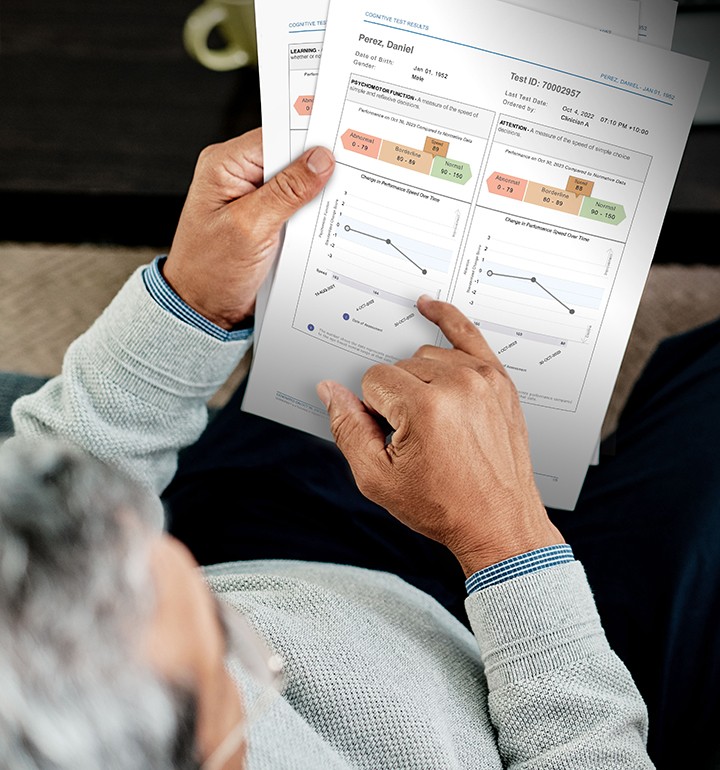
Humanizing data to advance brain health
Humanizing data to advance brain health
Humanizing data to advance brain health
Humanizing data to advance brain health
A collaboration with Cogstate that actively engaged
Physicians and Patients in the visual design of
cognitive assessment results
A collaboration with Cogstate that actively engaged Physicians and Patients in the visual design of cognitive assessment results
A collaboration with Cogstate that actively engaged
Physicians and Patients in the visual design of
cognitive assessment results
A collaboration with Cogstate that actively engaged Physicians and Patients in the visual design of cognitive assessment results
Sector
Sector
Sector
Healthtech
Healthtech
Healthtech
Offering
Offering
Offering
Human-Centered Design
Human-Centered Design
Research / Design / Implementation
Human-Centered Design
Method
Method
Method
Co-creation
Co-creation
Co-creation
Expertise
Expertise
Expertise
CX / UX / Behavior Change
CX / UX / Behavior Change
CX / UX / Behavior Change
Recently, scientists discovered innovative ways to slow the progression of Alzheimer’s disease. These disease-modifying therapies could extend quality of life for more than 13 million Americans — if, and only if, the disease is detected early.
This is problematic given many Primary Care Providers (PCPs) on the frontlines of Alzheimer’s detection actively avoid cognitive assessments. There are various reasons for this, including time. Also, many lack training in this area and, hence, confidence. So, they rely on patients and care partners to present concerns about cognition. However, fear of an Alzheimer’s diagnosis prevents many older Americans from speaking up.
Recently, scientists discovered innovative ways to slow the progression of Alzheimer’s disease. These disease-modifying therapies could extend quality of life for more than 13 million Americans — if, and only if, the disease is detected early.
This is problematic given many Primary Care Providers (PCPs) on the frontlines of Alzheimer’s detection actively avoid cognitive assessments. There are various reasons for this, including time. Also, many lack training in this area and, hence, confidence. So, they rely on patients and care partners to present concerns about cognition. However, fear of an Alzheimer’s diagnosis prevents many older Americans from speaking up.
Recently, scientists discovered innovative ways to slow the progression of Alzheimer’s disease. These disease-modifying therapies could extend quality of life for more than 13 million Americans — if, and only if, the disease is detected early.
This is problematic given many Primary Care Providers (PCPs) on the frontlines of Alzheimer’s detection actively avoid cognitive assessments. There are various reasons for this, including time. Also, many lack training in this area and, hence, confidence. So, they rely on patients and care partners to present concerns about cognition. However, fear of an Alzheimer’s diagnosis prevents many older Americans from speaking up.
Recently, scientists discovered innovative ways to slow the progression of Alzheimer’s disease. These disease-modifying therapies could extend quality of life for more than 13 million Americans — if, and only if, the disease is detected early.
This is problematic given many Primary Care Providers (PCPs) on the frontlines of Alzheimer’s detection actively avoid cognitive assessments. There are various reasons for this, including time. Also, many lack training in this area and, hence, confidence. So, they rely on patients and care partners to present concerns about cognition. However, fear of an Alzheimer’s diagnosis prevents many older Americans from speaking up.


Enter Cognigram, a HIPPA-compliant, FDA Class II exempt digital medical device designed by Cogstate to make cognitive assessments simple, reliable, and quick. Cognigram is powered by the Cogstate Brief Battery, which has been effectively used to monitor cognitive function in over 2,000 research studies. And scientifically validated for use with or without physician supervision — leaving PCPs time to discuss results and next steps, rather than conduct assessments.
Enter Cognigram, a HIPPA-compliant, FDA Class II exempt digital medical device designed by Cogstate to make cognitive assessments simple, reliable, and quick. Cognigram is powered by the Cogstate Brief Battery, which has been effectively used to monitor cognitive function in over 2,000 research studies. And scientifically validated for use with or without physician supervision — leaving PCPs time to discuss results and next steps, rather than conduct assessments.
Enter Cognigram, a HIPPA-compliant, FDA Class II exempt digital medical device designed by Cogstate to make cognitive assessments simple, reliable, and quick. Cognigram is powered by the Cogstate Brief Battery, which has been effectively used to monitor cognitive function in over 2,000 research studies. And scientifically validated for use with or without physician supervision — leaving PCPs time to discuss results and next steps, rather than conduct assessments.
Yet our research revealed that commercial adoption of Cognigram would require behavior change. It would require PCPs and older Americans to know that a product like Cognigram exists, be motivated to try it, have the skills to use it, and feel supported along the way.
Our research also revealed that the Cognigram report was a key leverage point in the assessment experience that could help catalyze the behavior changes needed to increase product adoption and inspire actions that advance brain health in clinics and homes across the U.S. But the visual communication of the results would require significant development.
Public Works was honored to lead the visual redesign of the Cognigram report.
Yet our research revealed that commercial adoption of Cognigram would require behavior change. It would require PCPs and older Americans to know that a product like Cognigram exists, be motivated to try it, have the skills to use it, understand how to translate the results into actions that advance brain health, and feel supported along the way.
Our research also revealed that the Cognigram report was a key leverage point in the assessment experience that could help catalyze the behavior changes needed to increase product adoption in clinics and homes across the U.S. But the visual communication of the results would require significant development.
Public Works was honored to lead the visual redesign of the Cognigram report.
Yet our research revealed that commercial adoption of Cognigram would require behavior change. It would require PCPs and older Americans to know that a product like Cognigram exists, be motivated to try it, have the skills to use it, understand how to translate the results into actions that advance brain health and feel supported along the way.
Our research also revealed that the Cognigram report was a key leverage point in the assessment experience that could help catalyze the behavior changes needed to increase product adoption in clinics and homes across the U.S. But the visual communication of the results would require significant development.
Public Works was honored to lead the visual redesign of the Cognigram report.
Yet our research revealed commercial adoption of Cognigram would require behavior change. It would require PCPs and older Americans to know that a product like Cognigram exists, be motivated to try it, have the skills to use it, understand how to translate the results into actions that advance brain health, and feel supported along the way.
Our research also revealed that the Cognigram report was a key leverage point in the assessment experience that could help catalyze the behavior changes needed to increase product adoption in clinics and homes across the U.S. But the visual communication of the results would require significant development.
Public Works was honored to lead the visual redesign of the Cognigram report.

Above Report prior to our Prototyping Lab
Above Report prior to our Prototyping Lab
Above Report prior to our Prototyping Lab
Actions
Insights
Outcomes
Impact
Actions
Insights
Outcomes
Impact
Actions
Insights
Outcomes
Impact
Actions
Insights
Outcomes
Impact
Below Report after our Prototyping Lab
Below Report after our Prototyping Lab
Below Report after our Prototyping Lab



Their innovative approach to prototyping transformed the Cognigram experience.
And made the report an essential tool for healthcare providers and patients. The process forced us to think about the report in a completely different way — we would never have got there on our own.
Their innovative approach to prototyping transformed the Cognigram experience.
And made the report an essential tool for healthcare providers and patients. It forced us to think about the report in a completely different way — we would never have got there on our own.
Their innovative approach to prototyping transformed the Cognigram experience.
And made the report an essential tool for healthcare providers and patients. The process forced us to think about the report in a completely different way — we would never have got there on our own.
Their innovative approach to prototyping transformed the Cognigram experience.
And made the report an essential tool for healthcare providers and patients. It forced us to think about the report in a completely different way — we would never have got there on our own.
Brad O'Connor, CEO
Cogstate
Brad O'Connor, CEO
Cogstate
Brad O'Connor, CEO
Cogstate
Public Works is a strategic design collaborative dedicated to advancing public health.
Assembly required
© 2024 Public Works Collaborative, LLC
Public Works is a strategic design collaborative dedicated to advancing public health.
Assembly required
© 2024 Public Works Collaborative, LLC
Public Works is a strategic design collaborative dedicated to advancing public health.
Assembly required
© 2024 Public Works Collaborative, LLC
Public Works is a strategic design collaborative dedicated to advancing public health.
Assembly required
© 2024 Public Works Collaborative, LLC





